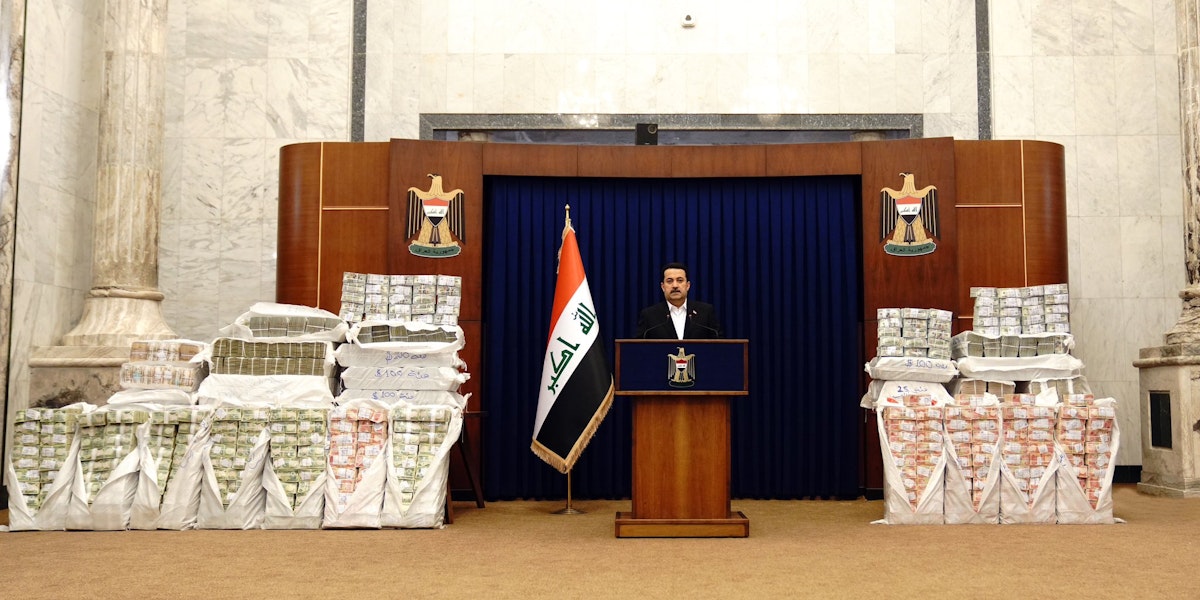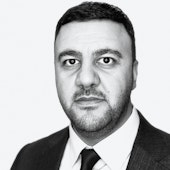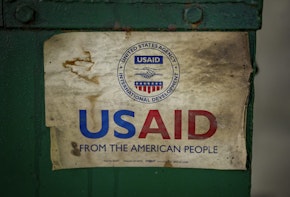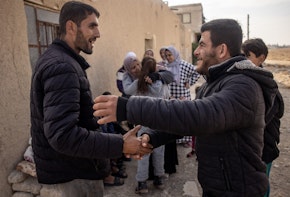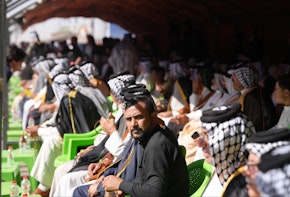It sounds like a Hollywood script: a network of thieves forge documents to withdraw $2.5 billion in cash from an idle government account. The money disappears into shadowy real estate purchases and foreign banks. A ringleader is apprehended as he is about to board his private jet to leave the country. High-ranking officials resign in shame. The staggering scandal involves politicians, Ministry of Finance officials, bank clerks, and crooked businessmen.
Alas, this is no movie, but real life in Iraq. Since mid-October, Iraqis have been gripped by an embezzlement case dubbed “the theft of the century” that has turned into a national drama as political forces try to limit the fallout.1 Details of how the heist was conducted and its political connections are still coming to light, and every revelation paints a more sordid picture of official involvement.
Even sadder is that this theft, which stands out for its brazenness and scale, is only the latest episode in a chain of large-scale corruption cases that stretch back to 2003. Despite its staggering size, the $2.5 billion heist may only account for 1 percent of the total lost to corruption since the fall of Saddam Hussein’s regime. In the last two decades, Iraqis have grown accustomed to news of corruption cases, but most corruption goes unpunished, or even unreported.
The so-called theft of the century underlines that Iraq is in the grip of systemized corruption devised, managed, and protected by the political elite who have controlled the country since 2003. The case implicates officials at the highest levels of government, and highlights the nature of state capture in Iraq and how compromised the accountability mechanisms are. The political elite divide up power and resources among themselves, using high oil prices to stave off economic collapse.
As grim as this realization is, it does offer an opportunity for action. Public anger is growing at the scale of injustice: elites skim billions off of Iraq’s wealth, while millions of people wallow in poverty. To effect change, this anger needs to be channeled into pressure and action to give reformists a platform. One way is to empower a new generation of brave politicians through elections. Another is demanding changes to legislation, institutions, and the judiciary to ensure they are more capable and willing to stamp out corruption and hold perpetrators to account. Finally, the international community also has an important role, both in pressuring Iraq to do better, and in prosecuting corruption that takes money abroad.
Mechanics of Corruption
Corruption has long been one of the most dangerous challenges facing Iraq, yet successive governments have struggled to improve the situation. Estimates vary, but officials have said that somewhere between $150 and $300 billion has been lost to corruption from Iraq’s wealth since 2003.2 Transparency International ranks Iraq’s public sector as one of the twenty-five most corrupt in the world, despite the government’s many efforts to reform.3
It’s not hard to diagnose the source of the problem. The chaotic period after the end of Saddam’s regime allowed the newly established political elite in Iraq to embed themselves in the system, and they have been protecting their spoils for nearly two decades. These elites systemized corruption in the post-2003 order by implanting their cronies across the government to ensure continued access to resources and political cover. The political parties have used the parliamentary system to capture the state, getting their people into parliament, government, and the judiciary. These parties have added millions of people to the public sector payroll as a form of patronage. With the influence this buys them, the parties then engage in staggering corruption that has made Iraq the world’s clearest contemporary example of kleptocracy.4 These parties control territory, media empires, militias, banks, and a diverse network of companies operating across all sectors.5
Corruption was also a problem under Saddam’s Ba’ath Party, but it had a different magnitude, and different causes. The large-scale extraction of public wealth was limited to the upper echelons of the regime. And the sanctions of the 1990s saw people turn to corruption out of desperation, with wasta (connections) and bribes deemed a necessity for survival.
The post-2003 order took corruption to another, systemic level that involved a multitude of players and parties. This systemization of corruption encouraged a new societal attitude that illicit gains from the state were a form of compensation for enduring the hardships of the previous regime. This attitude was partly enabled by the United States, which allowed mass corruption to operate under the guise of reconstruction. The total amount of government funds lost to corruption during the U.S. occupation (2003–11) was likely around $20 billion.6
After 2003, a new attitude emerged that saw illicit gains from the state as a form of compensation for enduring the previous regime.
Also at the root of Iraq’s kleptocracy is the consociationalist power-sharing system known colloquially among Iraqis by the Arabic word for “apportionment,” or muhassasa—a system agreed upon by the Iraqi opposition in exile before the 2003 war, and later adopted by the U.S. administration in Iraq.7 Iraq’s factional power-sharing formula is usually defined as a quota system that distributes a proportionate number of seats, positions, and ministries between Iraq’s different ethnic and sectarian groups. (Though muhassasa is not enshrined in law, it is very much the de facto system.) In reality, muhassasa’s proportional ethno-sectarian representation is a mirage, less about balancing power between communal identity groups and more about dividing up power among political factions. Each political player can exploit Iraq’s power-sharing mechanism to capture the state, while appearing to their constituents as if representation has been protected for each ethno-sectarian group.8 Thus, the public perceives muhassasa as guaranteeing political representation for each community, but it is really the method by which the political elite maintain power and divide the state’s spoils, mostly irrelevant of election results.9 Of late, sectarian politics have been in mild decline in Iraq, but muhassasa remains relevant and a cohesive organizing tool, as evidenced in the most recent government formation.10
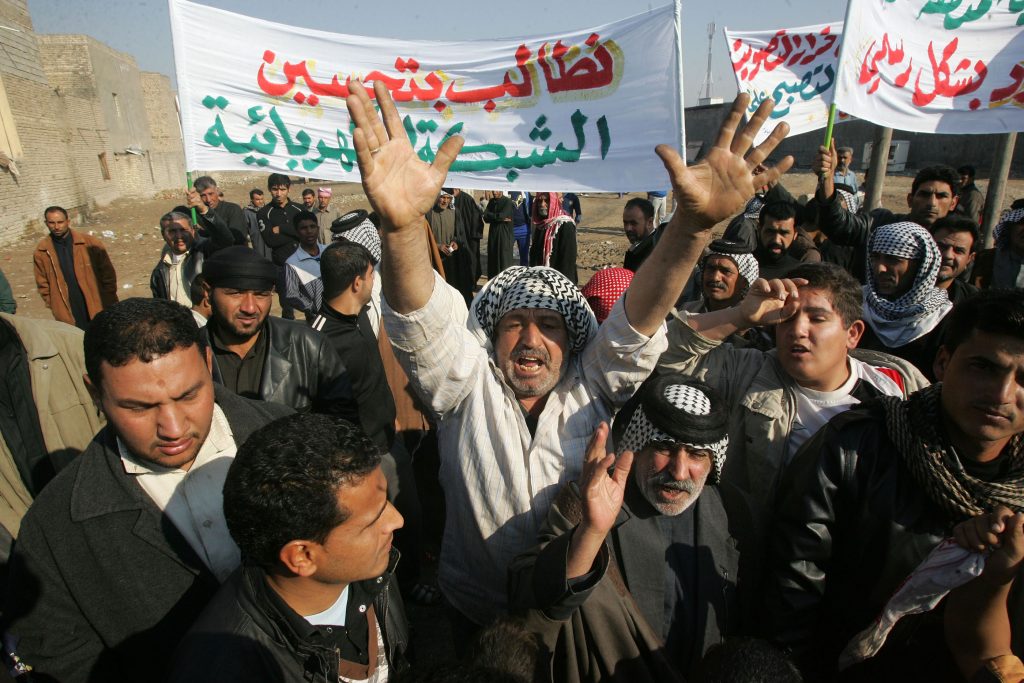
How the Corrupt System Works
The consociationalism in Iraq is textbook: power-sharing by coalition government, veto rights for the different groups, proportionality, and a high degree of autonomy for each component.11 By applying the factional power-sharing deals of muhassasa through the entire public sector, from minister level to entry level employee, and using consociationalism to accommodate competing players, the political elite found a way to capture a parliamentary democracy and use it to perpetuate their power and extract resources. Particular factors in Iraq make the system especially entrenched: diffuse and decentralized power, the threat of violence, a compromised judiciary and rule of law, a rentier economy with high oil prices, and foreign interference.
While the elite parties may have, at one time, been driven by political or ethno-sectarian interests and ideology, they are now led by their economic interests—interests that they need to protect. Removing Saddam had once provided a common cause. Now, the closest thing to a shared interest is the defense of a corrupt system that enriches them. That is why, despite these parties’ rivalries and differences, they close ranks and unite in the face of an external threat (such as their implicit backing of Adil Abdul-Mahdi’s repression of the October 2019 protests) or an internal one (such Muqtada al-Sadr’s attempt to take over the Green Zone in August 2022, which prompted the formation of a new coalition government). Solidarity around the perpetuation of Iraq’s system is at the heart of the country’s elite pact. The level of corruption is a metric for its coherence.
Corruption is so entrenched in the current political system that it has become the system. Whether in health care, education, financial services, construction, or any other sector, the political elite use intermediaries to inflate costs, eliminate competition, increase hiring, extort, blackmail, extract kickbacks and concessions, defraud, steal, and embezzle to make billions of dollars per year. This high-level racketeering protects senior leaders, since they are not directly involved in the process, but rather use their political influence to move people into key positions, protect them, and push them to help make money for their group. For example, my research has shown that around 40 percent of the federal government’s annual billion-dollar budget for importing medicines is allocated through corrupt processes—companies with powerful connections that win contracts and inflate costs, ultimately benefiting four political parties. The broader transnational pharmaceutical trade can reach $3 billion per year, very little of which benefits the state.12
The Iraqi elite use intermediaries to inflate costs, eliminate competition, extort, blackmail, extract kickbacks, defraud, steal, and embezzle.
Most of the corruption is based on hiring, public procurement, or licensing, some of which is sustained over many years and steadily funds the parties without drawing too much attention. The story of the $2.5 billion bank heist, which took place in the span of a year and is now firmly in the public eye, stands in stark contrast to such long-term corruption. The scandal came to light in mid-October as the administration of Mustafa al-Kadhimi was wrapping up. Some of the details of the scheme are yet to be revealed. What we know is that it involved the theft of 3.7 trillion Iraqi dinars (around $2.5 billion) from a bank account belonging to the General Commission of Taxes (GCT, a department of the Ministry of Finance) through the cashing of 247 checks between September 2021 and August 2022, by five shell companies that had no legal claim to the funds. The account held refundable guarantees levied by the Iraqi government against private sector companies who held contracts and tenders with the public sector; the funds had been levied in response to contractual disputes and failure to pay taxes.13 According to a source I spoke to, around one hundred companies, mostly in the oil sector, had deposited money into this account, almost all from 2016 and 2017 (although the account had been used as early as 2011).14 These companies were due to receive their deposits back on completion of their projects, but for various reasons (failure to register or pay taxes, giving up due to bureaucracy, or having outstanding contractual issues), had not.
By 2021, billions of dollars were sitting in this apparently poorly guarded account, ripe for the taking.
Learn More About Century International
The Heist’s High-Level Enablers
Some of the details of the $2.5 billion heist have been reported in the media or leaked on social media, and I was able to corroborate aspects of the timeline and facts by speaking to anonymous Iraqi government sources.15 What emerges is a picture of a theft orchestrated by multiple high-level officials, though the culpability of individuals remains unclear.
A 2017 regulation had required that money dispersed from the account be subject to audit and high-level approval. But companies with funds in the account had been complaining of the difficulty of obtaining money that was due to them. In July 2021, Haitham al-Jabouri, the head of parliament’s Finance Committee, canceled the auditing system and gave the GCT sole approval for withdrawals from the account. (Jabouri effected this with a letter that was sent in the name of the Finance Committee, but without its knowledge.)
The prime minister’s office sent a letter endorsing Jabouri’s decision in August 2021. On the same day, it replaced the head of the GCT, Shakir al-Zubaidi, with Usama Husam Jawdat. Jawdat was a mid-level employee and an unlikely choice to head the GCT, a fact that has since raised suspicions that the prime minister’s office simply chose someone it could control to enable the heist. Meanwhile, Jabouri followed up with another note to the Ministry of Finance instructing it to adhere to the “instructions” from the prime minister’s office and expedite payments.
On September 6, 2021, Ali Allawi, the finance minister, formed a committee to oversee approvals for payments from the doomed account, with the first payment approved three days later.
The next eleven months appear to have been a free-for-all for the five shell companies that cashed the checks. The companies used forged letters to claim that they were acting on behalf of the original fund claimants; three of the companies had been established in July 2021, just before the withdrawals began, indicating they were created for the sole purpose of embezzling.16 The forged letters passed the Rafidain Bank’s auditing process, and large sums were paid out at a single branch in Baghdad.
There was one apparent hiccup in the heist. On November 4, 2021, after ten checks had already been paid out from the account, Allawi flagged the potential for corruption and ordered that payments were only to be made following his explicit approval. However, withdrawals continued, with the last on August 11, 2022, just five days before Allawi resigned. According to Allawi, the payments were made without his knowledge, and were part of why he resigned.17 But it seems strange that he did not check whether any payments were being made between his November 2021 decree and his resignation.
The heist and its fallout have touched the entire Iraqi political spectrum. Media reports have connected some of the shell companies to the U.S.-backed former prime minister Kadhimi and his staff, and others to the pro-Iran party Badr, through officials in the Ministry of Finance.18 It is not surprising that the theft benefited officials and parties backed by both the United States and Iran, because despite appearing to be politically at odds with each other, the systemic corruption in Iraq accommodates and requires the collaboration of such political rivals and enemies. These opponents fight each other in public but work together in private to enrich themselves, regardless of political and ideological positions.
Weak Official Excuses
The Ministry of Finance narrative is that employees at Rafidain Bank conspired with the company owners to withdraw the $2.5 billion; the ministry points to the fact that no paperwork can be found that shows the GCT or the Ministry of Finance approving all the withdrawals after November 2021 (sources state the paper trail had been deliberately destroyed).19 But this narrative is weak: there are at least sixteen individuals implicated in the scheme, some of whom were government officials. The heist was uncovered on August 16, 2022, the day Allawi resigned. He was replaced by Ihsan Abdul Jabbar as acting minister. On the day he took over, Abdul Jabbar immediately ordered an investigation into withdrawals from the GCT account, showing that he—and the ministry—already had an idea of what was going on.
Further, the process to withdraw money from the GCT account requires eight lengthy steps, and to cash out such large sums within such a short time requires heavy political backing. Information from sources points to a highly organized scheme with top-level political cover. According to one source, the prime minister’s office made direct calls to the GCT and Rafidain Bank to make sure the withdrawals were processed quickly.
Other details also suggest a cover-up. The GCT had written to both the Federal Board of Supreme Audit (FBSA) and the Integrity Commission—entities with anticorruption remits—in August 2021 before the withdrawals were made, asking if they had any issue with the GCT making payments. Presumably, the GCT made this inquiry simply to gain legal cover and to implicate the FBSA and Integrity Commission in the future, should the scheme be uncovered. And the Integrity Commission even sent an investigator to check complaints against the GCT as the withdrawals began, but found no reason to start an investigation.
It’s obvious that the heist required high-level involvement, though the list of suspects remains long. It includes Kadhimi and senior staff in his office, top security officials, Ministry of Finance officials, Rafidain Bank staff, Central Bank of Iraq officials, the five company owners and staff, officials at the Integrity Commission, and others well placed to enable the scheme. Assessing the names shows they are tied to six different political entities (including the four parties mentioned above and other, less formal groupings). But more importantly, it gives a clear understanding of how systemized corruption is, the depth of state capture, and the capacity of bad actors to engineer a complex heist with such staggering amounts over a short period of time.
Not Looking for a Hero
The heist is currently being investigated by the judiciary, and there is massive public pressure to uncover all the details and prosecute the case quickly. The most high-profile arrest so far has been that of Noor Zuhair Jasim, one of the shell company owners, who stole the largest portion of the $2.5 billion; he was detained as his private jet was preparing to depart Baghdad Airport.20
Mohammed Shia al-Sudani, the new prime minister, is eager to show progress on this case, because one of his stated priorities is to fight corruption. In late November, he made an appearance next to bundles of cash that had already been recovered. As a publicity stunt, it was something of a flop: the cash represented just 5 percent of the total amount stolen, which was only acquired as part of a deal that saw Noor Jasim released on bail.21
For the political elite, the ideal result of the investigation will be that blame is pinned on Rafidain Bank and low-level staff. This would avoid the scandal that Noor Jasim could expose by revealing his political contacts. But the elite’s favored scenario, while still possible, could be difficult to achieve given the November arrest of Haitham al-Jabouri, who is believed to be the key political enabler in the heist.22
Other aspects of the case’s outcome are also still uncertain. For example, it is still possible to recover the stolen money, but only if the political will exists. The $2.5 billion was withdrawn as cash, with each of the 247 checks cashed out the same day they were issued, in full, despite Rafidain Bank not usually holding such large sums in a single branch (for example, one check was for almost $62 million). Of the $2.5 billion, most is believed to be inside Iraq, with more than $1 billion invested in fifty-five properties in Baghdad, and another $1 billion in other properties, land, and assets. The remainder of the booty is still cash being moved around on a daily basis, some of it abroad.
Iran-backed, U.S.-backed, self-styled reformers, supporters of the status quo—all factions benefit from corruption schemes.
But if the political will doesn’t coalesce around recovering the funds, the state could find itself an even bigger loser: the original claimants on the $2.5 billion may yet try to withdraw the amounts, which could mean the government is on the hook for $5 billion total.
Whatever the outcome of this case, it shows that everybody is feeding from the trough of corruption, and that there are no good guys, only a bad system. Iran-backed, U.S.-backed, self-styled reformers, supporters of the status quo—all factions benefit from corruption schemes.
Allawi, the finance minister, was supposed to have been specifically empowered by Kadhimi, the United States, and other international backers to fight corruption. He even released a white paper in 2020 detailing reforms, which was internationally welcomed.23 But Allawi then allowed an enormous theft to take place. In fact, the Kadhimi government is accused of using the guise of anticorruption to facilitate shakedowns—similar to Saudi crown prince Mohammed bin Salman’s shakedown of Saudi elites at a Riyadh Ritz-Carlton in 2017.24 According to sources I spoke to, the committee formed by Kadhimi (grandly titled the Permanent Committee to Investigate Corruption and Significant Crimes formed by Executive Order 29 on August 27, 2020) was used for a year and a half to target politically vulnerable individuals who had amassed wealth through corruption. These individuals were detained and subjected to torture and blackmail to extort millions of dollars for the benefit of Kadhimi and his circle.25 Essentially, it was bad people doing bad things to bad people, with the committee only officially prosecuting fourteen cases, leading to nineteen convictions.26
The targets were taken to two detention facilities, one operated by the intelligence services in downtown Baghdad on the site of the old Al Muthana Airport, and the other in a Ministry of Interior detention site near Baghdad Airport, with allegations that Kadhimi himself was involved in the shakedowns.27 Interestingly, the United States has acknowledged the detentions and the allegations that “the detainees had suffered physical abuse in custody and were denied access to medical and legal services.”28 The head of the committee, Ahmad Abu Ragheef, the deputy minister of interior for federal intelligence and investigation affairs, with the rank of general, was recently arrested and accused of torturing to death a former director-general in the Ministry of Trade.29
While the Sudani administration is undoubtedly engaged in a purging of officials from the Kadhimi era for political purposes, there should be accountability for abuses in the Kadhimi administration and the previous governments. The system itself is rigged to facilitate corruption and to prevent accountability. Moreover, political actors across the spectrum—pro- or anti-U.S.—are engaged in corruption. And even when the government launches “anticorruption” initiatives, they are used for political or corrupt purposes.
The Rafidain Bank case is an example of how politically organized corruption mostly occurs through influence and control of the public sector. The higher levels of the civil service, known as the special grades, are granted their positions by a parliamentary or cabinet vote, or by the prime minister. The same process is used to fill senior positions in the military, the judiciary, and the independent commissions, such as the Electoral Commission, the Integrity Commission, and the Central Bank. Due to their power in parliament and the government, political parties use the power-sharing formula of muhassasa, horse-trading, and even kickbacks to apportion these important posts, thereby maintaining control over the levers of power and, more importantly, over accountability mechanisms. Thus, even when there is a reform-minded prime minister, the parties have the tools to blunt any deep attempt at change. This makes reform almost impossible, as the political system is corrupted and the mechanisms to implement rule of law and accountability are compromised.
Fighting a Rotten System
The first step to defeating corruption is garnering the necessary political will to challenge the powerful players behind it. In plain terms, this is a fight against the mafia that rules Iraq, so plenty of courage, determination, and creativity are required. Because the situation is so dire, directly taking on the political elite may not work—they control the system. That’s why building public opinion and pressure has more of a chance of success to spur reforms.
First, there needs to be a concerted effort to form a network of like-minded politicians, civil servants, lawyers, judges, researchers, journalists, and security officials to put the spotlight on corruption cases and engage public opinion. Second, lessons need to be learned from countries such as Italy, which made progress against the Italian mafia in the 1990s and 2000s by using public anger to force through reforms.30 Third, activists and community leaders should look to the next elections as an opportunity to elect reformers and reduce the power of the political elite in parliament. While it is unrealistic to expect Sudani to lead the charge and deliver immediate results, he remains the person best placed to undertake reforms and force the political elite into change. As the analysts Renad Mansour and Hayder Al-Shakeri have written, Sudani needs to build a coalition of reformists, in and outside government, who can build momentum for reform.31
One of the key tools for fighting corruption in Iraq already exists: the Integrity Commission, which works to prevent, monitor, and prosecute corruption. The political elite have used Iraq’s particularly corrosive form of consociationalism (muhassasa), to keep it toothless, but it still has the potential to be very effective if it is shaken up. Across the political spectrum, there is a lack of political will to empower entities like the Integrity Commission to do its work properly and independently, and to truly root out corruption. As it stands, the Integrity Commission itself is appointed by the cabinet, through muhassasa; other institutions do not respond to the commission’s processes; and just 7 percent of the thousands of cases the commission refers to the judiciary are successfully prosecuted.32 The commission is busy, but its success in preventing and punishing corruption is limited. This seems to be by design—the political elite do not want the Integrity Commission to be further empowered.
The Integrity Commission relies on receiving paper-based data from other institutions and struggles to fully investigate because of lack of access, reliable information, capacity, and authority. Unless the civil service is modernized, and financial records are moved to electronic systems, the Integrity Commission will continue to struggle to prevent corruption from occurring and only manage to effectively hold accountable a limited number of corruption cases after they occur. The gap between the number of cases the Integrity Commission investigates and those that the judiciary prosecutes is a key metric for judging the efforts of the Integrity Commission, which points to the feebleness of its successes. Without improvements to the way the commission works with the judiciary, corruption at the highest levels will continue to escape justice. Specific departments in the Integrity Commission, such as Investigations and Preventions, are critical to its success, but need more support and capacity to do their work better. The Integrity Commission would also be aided if the government, the legislature, or both compelled other institutions to respond to the commission, or by giving the commission further powers. One idea is to bring back inspectors general who operate in ministries but are completely independent of ministers and report solely to the Integrity Commission.
The first step to defeating corruption is garnering the necessary political will to challenge the powerful players behind it.
The potential impact of the international community on the anticorruption issue should not be underestimated. Much of the tens of billions of dollars lost to corruption ends up abroad, and Iraq struggles to repatriate those funds and the criminals responsible. Help from other countries would deter attempts to launder money. The international community should put more pressure on Iraq to improve its anticorruption metrics and support civil society efforts to bolster accountability. Without real reforms, Iraq’s wealth will continue to be siphoned off by mafias, and future generations will be robbed of opportunities for a decent life.
Header image: Iraqi prime minister Mohammed Shia al-Sudani stands in front of piles of money recovered from the “heist of the century.” Source: Twitter page of the Iraqi prime minister’s office, November 27, 2022, https://twitter.com/IraqiPMO/status/1596904293105561607/photo/1.
Notes
- Simona Foltyn, “‘Heist of the Century’: How $2.5BN Was Plundered from Iraqi State Funds,” Guardian, November 20, 2022, https://www.theguardian.com/world/2022/nov/20/heist-century-iraq-state-funds-tax-embezzlement.
- Mohammed Tawfeeq, “Iraq Estimates That $150 Billion of Its Oil Money Has Been Stolen from the Country since the Us-Led Invasion of 2003,” CNN, May 23, 2021, https://edition.cnn.com/2021/05/23/middleeast/iraq-oil-money-us-invastion-intl/index.html; Toby Dodge and Renad Mansour, “Politically Sanctioned Corruption and Barriers to Reform in Iraq,” Chatham House, June 17, 2021, https://www.chathamhouse.org/2021/06/politically-sanctioned-corruption-and-barriers-reform-iraq/03-rethinking-corruption-iraq.
- “2021 Corruption Perceptions Index,” Transparency International, https://www.transparency.org/en/cpi/2021/index/irq.
- Renad Mansour and Hayder Al-Shakeri, “Can Iraq’s new government reform the corrupt system?,” Chatham House, November 30, 2022, https://www.chathamhouse.org/2022/11/can-iraqs-new-government-reform-corrupt-system.
- Robert F. Worth, “Inside the Iraqi Kleptocracy,” New York Times Magazine, July 29, 2020, https://www.nytimes.com/2020/07/29/magazine/iraq-corruption.html.
- “Learning from Iraq,” Special Inspector General for Iraq Reconstruction, March 2013, https://cybercemetery.unt.edu/archive/sigir/20131001080029/http:/www.sigir.mil/files/learningfromiraq/Report_-_March_2013.pdf.
- Taif Alkhudary, “How Iraq’s sectarian system came to be,” Al Jazeera, March 29, 2020, https://www.aljazeera.com/opinions/2020/3/29/how-iraqs-sectarian-system-came-to-be.
- Fanar Haddad, Understanding ‘Sectarianism’: Sunni-Shi’a Relations in the Modern Arab World (New York: Oxford University Press, 2020), chapter 7 (“Iraq, 2003–2018: Sectarian Identity and the Contestation of the State”).
- See Thanassis Cambanis and Sajad Jiyad, “When Everyone’s a Shia Islamist, How Should We Understand Shia Politics?,” The Century Foundation, September 26, 2022, https://tcf.org/content/commentary/when-everyones-a-shia-islamist-how-should-we-understand-shia-politics/, and other reports in Century International’s Shia Politics Working Group series which look at the muhassasa political system.
- Toby Dodge and Renad Mansour, “Sectarianization and De-sectarianization in the Struggle for Iraq’s Political Field,” The Review of Faith and International Affairs 18, no. 1 (January 2020), 58–69.
- Nancy Ezzeddine and Beatrice Noun, “Iraq and Lebanon’s tortuous paths to reform,” Clingendael, December 2020, https://www.clingendael.org/sites/default/files/2020-12/iraq-and-lebanons-tortuous-paths-to-reform.pdf.
- Renad Mansour and Omar Sirri, “Moving Medicine in Iraq: The Political Economy of the Pharmaceutical Trade,” Chatham House, June 8, 2022, https://www.chathamhouse.org/2022/06/moving-medicine-iraq-political-economy-pharmaceutical-trade; and Renad Mansour, “Moving Medicine in Iraq: Networks Fuelling Everyday Conflict,” Chatham House, November 29, 2022, https://www.chathamhouse.org/2022/11/moving-medicine-iraq-networks-fuelling-everyday-conflict.
- Foltyn, “Heist of the Century.” In each case, the amount levied was 10 percent of the contract size, contributing to the considerable sum in the bank account.
- Anonymous Ministry of Finance official, interview with the author, Baghdad, November 2022.
- Timeline and facts were corroborated by anonymous sources in the Ministry of Finance, Integrity Commission, Federal Board of Supreme Audit, the judiciary, and the prime minister’s office, interviews with the author, Baghdad, November 2022.
- Suadad al-Salhy, “Iraq’s ‘Theft of the Century’: How $2.5BN in Public Money ‘Evaporated’,” Middle East Eye, November 21, 2022, https://www.middleeasteye.net/news/iraq-theft-century-how-25-billion-public-money-evaporated.
- Robert F. Worth, “The Most Stinging Resignation Letter Ever Written,” Atlantic, September 22, 2022, https://www.theatlantic.com/international/archive/2022/09/ali-allawi-iraq-corruption-resignation-letter/671509/.
- Foltyn, “Heist of the Century.”
- Information based on my interviews.
- Raya Jalabi, “Iraq Reels from $2.5BN Tax ‘Heist of the Century,’” Financial Times, November 17, 2022, https://www.ft.com/content/2f3067f1-fb59-4e29-a462-b8b9c12d86d5.
- “Al-Sudani Announces the Recovery of Part of the Stolen Money from the Tax Guarantees,” Iraqi News Agency, November 27, 2022, https://ina.iq/eng/23242-al-sudani-announces-the-retrieval-of-part-of-the-stolen-money-from-tax-deposits.html.
- Suadad al-Salhy, “Iraq’s ‘Theft of the Century’: Former Senior Parliamentary Official Arrested,” Middle East Eye, November 30, 2022, https://www.middleeasteye.net/news/iraq-theft-century-ex-head-parliamentary-finance-committee-arrested.
- “The White Paper for Economic Reforms: Vision and Key Objectives,” Government of Iraq, October 22, 2020, https://gds.gov.iq/iraqs-white-paper-for-economic-reforms-vision-and-key-objectives/.
- Dan De Luce, Ken Dilanian, and Robert Windrem, “How a Saudi Royal Crushed His Rivals in a ‘Shakedown’ at the Ritz-Carlton,”, NBC, November 3, 2018, https://www.nbcnews.com/news/mideast/how-saudi-royal-crushed-his-rivals-shakedown-ritz-carlton-n930396.
- The committee was deemed unconstitutional by the Federal Supreme Court by ruling 169 on March 7, 2022, because it subverted the work of the Integrity Commission, which is an institution independent of government. The ruling, in Arabic, can be found at https://www.iraqfsc.iq/krarid/169_fedn_2021.pdf.
- “Annual Report 2021,” Integrity Commission, February 17, 2022, accessed November 30, 2022, https://nazaha.iq/pdf_up/6848/Report2021.pdf.
- One example of these allegations was recently unveiled by talk show host Ahmad Mulla Talal. In this case, bribes of $100 million were used to facilitate mobile phone license acquisition through Kadhimi’s chief of staff. See “With Mulla Talal …” (in Arabic), uploaded to YouTube by Hosn al-Zaydan on November 22, 2022, https://www.youtube.com/watch?v=WOGaeZHNJaE.
- “2020 Country Reports on Human Rights Practices: Iraq,” United States Department of State, March 30, 2021, https://www.state.gov/reports/2020-country-reports-on-human-rights-practices/iraq/. Reports of the abuses are frequently mentioned in the Iraqi media, see Al-Ahad TV (@ahadtv), Twitter status update, December 4, 2022, https://twitter.com/ahadtv/status/1599651614331404288?s=20&t=K-VCaWIqLEFlvzQIzrPLMA; and other similar allegations of abuse such as “Raad’s brother, the guard, tells how his brother was arrested …,” uploaded to YouTube by Dijlah TV ((@DijlahTV) on December 6, 2022, https://youtu.be/SvomNk_tuyM.
- “Source: An arrest warrant against Ahmed Abu Ragheef on charges of killing a director general at the Ministry of Trade” (in Arabic), Alrabiaa TV, December 1, 2022, https://www.alrabiaa.tv/article/38673/مصدر:-أمر-قبض-ضد-أحمد-أبو-رغيف-بتهمة-قتل-مدير-عام-بوزارة-التجارة-38673. https://bit.ly/3iuTDGY.
- Valentina Saini, “Remembering Falcone: How Italy Almost Became a Narco-State,” EUObserver, May 20, 2022, https://euobserver.com/rule-of-law/155016.
- Mansour and Shakeri, “Can Iraq’s New Government Reform the Corrupt System?”
- For example, per its 2020 annual report, the Integrity Commission referred 8,695 new full inquiries to the judiciary for a criminal investigation, where it believed it had a strong case and would obtain an indictment. Of these, only 1,147 made it to trial, with only 639 successful initial convictions. The low rate of prosecution does not reflect well on the Integrity Commission or the judiciary. See “Annual Report 2020,” Integrity Commission, February 16, 2021, https://nazaha.iq/pdf_up/6273/tq2020.pdf.
